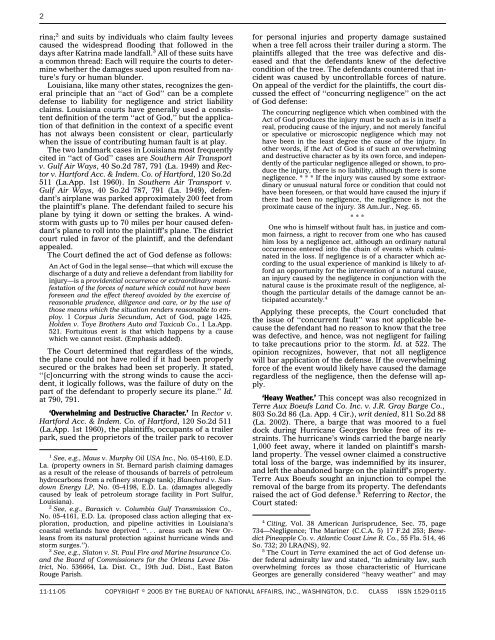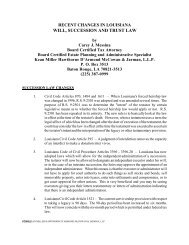'Act of God' Defense in Louisiana - Kean Miller LLP
'Act of God' Defense in Louisiana - Kean Miller LLP
'Act of God' Defense in Louisiana - Kean Miller LLP
You also want an ePaper? Increase the reach of your titles
YUMPU automatically turns print PDFs into web optimized ePapers that Google loves.
2<br />
r<strong>in</strong>a; 2 and suits by <strong>in</strong>dividuals who claim faulty levees<br />
caused the widespread flood<strong>in</strong>g that followed <strong>in</strong> the<br />
days after Katr<strong>in</strong>a made landfall. 3 All <strong>of</strong> these suits have<br />
a common thread: Each will require the courts to determ<strong>in</strong>e<br />
whether the damages sued upon resulted from nature’s<br />
fury or human blunder.<br />
<strong>Louisiana</strong>, like many other states, recognizes the general<br />
pr<strong>in</strong>ciple that an ‘‘act <strong>of</strong> God’’ can be a complete<br />
defense to liability for negligence and strict liability<br />
claims. <strong>Louisiana</strong> courts have generally used a consistent<br />
def<strong>in</strong>ition <strong>of</strong> the term ‘‘act <strong>of</strong> God,’’ but the application<br />
<strong>of</strong> that def<strong>in</strong>ition <strong>in</strong> the context <strong>of</strong> a specific event<br />
has not always been consistent or clear, particularly<br />
when the issue <strong>of</strong> contribut<strong>in</strong>g human fault is at play.<br />
The two landmark cases <strong>in</strong> <strong>Louisiana</strong> most frequently<br />
cited <strong>in</strong> ‘‘act <strong>of</strong> God’’ cases are Southern Air Transport<br />
v. Gulf Air Ways, 40 So.2d 787, 791 (La. 1949) and Rector<br />
v. Hartford Acc. & Indem. Co. <strong>of</strong> Hartford, 120 So.2d<br />
511 (La.App. 1st 1960). In Southern Air Transport v.<br />
Gulf Air Ways, 40 So.2d 787, 791 (La. 1949), defendant’s<br />
airplane was parked approximately 200 feet from<br />
the pla<strong>in</strong>tiff’s plane. The defendant failed to secure his<br />
plane by ty<strong>in</strong>g it down or sett<strong>in</strong>g the brakes. A w<strong>in</strong>dstorm<br />
with gusts up to 70 miles per hour caused defendant’s<br />
plane to roll <strong>in</strong>to the pla<strong>in</strong>tiff’s plane. The district<br />
court ruled <strong>in</strong> favor <strong>of</strong> the pla<strong>in</strong>tiff, and the defendant<br />
appealed.<br />
The Court def<strong>in</strong>ed the act <strong>of</strong> God defense as follows:<br />
An Act <strong>of</strong> God <strong>in</strong> the legal sense—that which will excuse the<br />
discharge <strong>of</strong> a duty and relieve a defendant from liability for<br />
<strong>in</strong>jury—is a providential occurrence or extraord<strong>in</strong>ary manifestation<br />
<strong>of</strong> the forces <strong>of</strong> nature which could not have been<br />
foreseen and the effect there<strong>of</strong> avoided by the exercise <strong>of</strong><br />
reasonable prudence, diligence and care, or by the use <strong>of</strong><br />
those means which the situation renders reasonable to employ.<br />
1 Corpus Juris Secundum, Act <strong>of</strong> God, page 1425,<br />
Holden v. Toye Brothers Auto and Taxicab Co., 1 La.App.<br />
521. Fortuitous event is that which happens by a cause<br />
which we cannot resist. (Emphasis added).<br />
The Court determ<strong>in</strong>ed that regardless <strong>of</strong> the w<strong>in</strong>ds,<br />
the plane could not have rolled if it had been properly<br />
secured or the brakes had been set properly. It stated,<br />
‘‘[c]oncurr<strong>in</strong>g with the strong w<strong>in</strong>ds to cause the accident,<br />
it logically follows, was the failure <strong>of</strong> duty on the<br />
part <strong>of</strong> the defendant to properly secure its plane.’’ Id.<br />
at 790, 791.<br />
‘Overwhelm<strong>in</strong>g and Destructive Character.’ In Rector v.<br />
Hartford Acc. & Indem. Co. <strong>of</strong> Hartford, 120 So.2d 511<br />
(La.App. 1st 1960), the pla<strong>in</strong>tiffs, occupants <strong>of</strong> a trailer<br />
park, sued the proprietors <strong>of</strong> the trailer park to recover<br />
1 See, e.g., Maus v. Murphy Oil USA Inc., No. 05-4160, E.D.<br />
La. (property owners <strong>in</strong> St. Bernard parish claim<strong>in</strong>g damages<br />
as a result <strong>of</strong> the release <strong>of</strong> thousands <strong>of</strong> barrels <strong>of</strong> petroleum<br />
hydrocarbons from a ref<strong>in</strong>ery storage tank); Blanchard v. Sundown<br />
Energy LP, No. 05-4198, E.D. La. (damages allegedly<br />
caused by leak <strong>of</strong> petroleum storage facility <strong>in</strong> Port Sulfur,<br />
<strong>Louisiana</strong>).<br />
2 See, e.g., Barasich v. Columbia Gulf Transmission Co.,<br />
No. 05-4161, E.D. La. (proposed class action alleg<strong>in</strong>g that exploration,<br />
production, and pipel<strong>in</strong>e activities <strong>in</strong> <strong>Louisiana</strong>’s<br />
coastal wetlands have deprived ‘‘. . . areas such as New Orleans<br />
from its natural protection aga<strong>in</strong>st hurricane w<strong>in</strong>ds and<br />
storm surges.’’).<br />
3 See, e.g., Slaton v. St. Paul Fire and Mar<strong>in</strong>e Insurance Co.<br />
and the Board <strong>of</strong> Commissioners for the Orleans Levee District,<br />
No. 536664, La. Dist. Ct., 19th Jud. Dist., East Baton<br />
Rouge Parish.<br />
for personal <strong>in</strong>juries and property damage susta<strong>in</strong>ed<br />
when a tree fell across their trailer dur<strong>in</strong>g a storm. The<br />
pla<strong>in</strong>tiffs alleged that the tree was defective and diseased<br />
and that the defendants knew <strong>of</strong> the defective<br />
condition <strong>of</strong> the tree. The defendants countered that <strong>in</strong>cident<br />
was caused by uncontrollable forces <strong>of</strong> nature.<br />
On appeal <strong>of</strong> the verdict for the pla<strong>in</strong>tiffs, the court discussed<br />
the effect <strong>of</strong> ‘‘concurr<strong>in</strong>g negligence’’ on the act<br />
<strong>of</strong> God defense:<br />
The concurr<strong>in</strong>g negligence which when comb<strong>in</strong>ed with the<br />
Act <strong>of</strong> God produces the <strong>in</strong>jury must be such as is <strong>in</strong> itself a<br />
real, produc<strong>in</strong>g cause <strong>of</strong> the <strong>in</strong>jury, and not merely fanciful<br />
or speculative or microscopic negligence which may not<br />
have been <strong>in</strong> the least degree the cause <strong>of</strong> the <strong>in</strong>jury. In<br />
other words, if the Act <strong>of</strong> God is <strong>of</strong> such an overwhelm<strong>in</strong>g<br />
and destructive character as by its own force, and <strong>in</strong>dependently<br />
<strong>of</strong> the particular negligence alleged or shown, to produce<br />
the <strong>in</strong>jury, there is no liability, although there is some<br />
negligence. ***Ifthe<strong>in</strong>jurywascaused by some extraord<strong>in</strong>ary<br />
or unusual natural force or condition that could not<br />
have been foreseen, or that would have caused the <strong>in</strong>jury if<br />
there had been no negligence, the negligence is not the<br />
proximate cause <strong>of</strong> the <strong>in</strong>jury. 38 Am.Jur., Neg. 65.<br />
***<br />
One who is himself without fault has, <strong>in</strong> justice and common<br />
fairness, a right to recover from one who has caused<br />
him loss by a negligence act, although an ord<strong>in</strong>ary natural<br />
occurrence entered <strong>in</strong>to the cha<strong>in</strong> <strong>of</strong> events which culm<strong>in</strong>ated<br />
<strong>in</strong> the loss. If negligence is <strong>of</strong> a character which accord<strong>in</strong>g<br />
to the usual experience <strong>of</strong> mank<strong>in</strong>d is likely to afford<br />
an opportunity for the <strong>in</strong>tervention <strong>of</strong> a natural cause,<br />
an <strong>in</strong>jury caused by the negligence <strong>in</strong> conjunction with the<br />
natural cause is the proximate result <strong>of</strong> the negligence, although<br />
the particular details <strong>of</strong> the damage cannot be anticipated<br />
accurately. 4<br />
Apply<strong>in</strong>g these precepts, the Court concluded that<br />
the issue <strong>of</strong> ‘‘concurrent fault’’ was not applicable because<br />
the defendant had no reason to know that the tree<br />
was defective, and hence, was not negligent for fail<strong>in</strong>g<br />
to take precautions prior to the storm. Id. at 522. The<br />
op<strong>in</strong>ion recognizes, however, that not all negligence<br />
will bar application <strong>of</strong> the defense. If the overwhelm<strong>in</strong>g<br />
force <strong>of</strong> the event would likely have caused the damage<br />
regardless <strong>of</strong> the negligence, then the defense will apply.<br />
‘Heavy Weather.’ This concept was also recognized <strong>in</strong><br />
Terre Aux Boeufs Land Co. Inc. v. J.R. Gray Barge Co.,<br />
803 So.2d 86 (La. App. 4 Cir.), writ denied, 811 So.2d 88<br />
(La. 2002). There, a barge that was moored to a fuel<br />
dock dur<strong>in</strong>g Hurricane Georges broke free <strong>of</strong> its restra<strong>in</strong>ts.<br />
The hurricane’s w<strong>in</strong>ds carried the barge nearly<br />
1,000 feet away, where it landed on pla<strong>in</strong>tiff’s marshland<br />
property. The vessel owner claimed a constructive<br />
total loss <strong>of</strong> the barge, was <strong>in</strong>demnified by its <strong>in</strong>surer,<br />
and left the abandoned barge on the pla<strong>in</strong>tiff’s property.<br />
Terre Aux Boeufs sought an <strong>in</strong>junction to compel the<br />
removal <strong>of</strong> the barge from its property. The defendants<br />
raised the act <strong>of</strong> God defense. 5 Referr<strong>in</strong>g to Rector, the<br />
Court stated:<br />
4 Cit<strong>in</strong>g, Vol. 38 American Jurisprudence, Sec. 75, page<br />
734—Negligence; The Mar<strong>in</strong>er (C.C.A. 5) 17 F.2d 253; Benedict<br />
P<strong>in</strong>eapple Co. v. Atlantic Coast L<strong>in</strong>e R. Co., 55 Fla. 514, 46<br />
So. 732; 20 LRA(NS), 92.<br />
5 The Court <strong>in</strong> Terre exam<strong>in</strong>ed the act <strong>of</strong> God defense under<br />
federal admiralty law and stated, ‘‘In admiralty law, such<br />
overwhelm<strong>in</strong>g forces as those characteristic <strong>of</strong> Hurricane<br />
Georges are generally considered ‘‘heavy weather’’ and may<br />
11-11-05 COPYRIGHT 2005 BY THE BUREAU OF NATIONAL AFFAIRS, INC., WASHINGTON, D.C. CLASS ISSN 1529-0115




![Joint Empl [PFP#221528190] - Kean Miller LLP](https://img.yumpu.com/23793020/1/190x245/joint-empl-pfp221528190-kean-miller-llp.jpg?quality=85)




